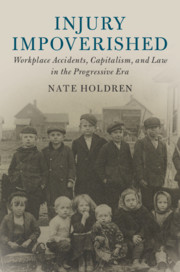Book contents
- Injury Impoverished
- Cambridge Historical Studies in American Law and Society
- Injury Impoverished
- Copyright page
- Epigraph
- Contents
- Tables
- Acknowledgments
- Introduction
- Part I The Eclipse of Recognition and the Rise of the Tyranny of the Table
- Part II New Machineries of Injustice
- 4 The Disabling Power of Law and Market
- 5 Insuring Injustice
- 6 Discrimination Technicians and Human Weeding
- Conclusion
- Coda
- Index
6 - Discrimination Technicians and Human Weeding
from Part II - New Machineries of Injustice
Published online by Cambridge University Press: 06 April 2020
- Injury Impoverished
- Cambridge Historical Studies in American Law and Society
- Injury Impoverished
- Copyright page
- Epigraph
- Contents
- Tables
- Acknowledgments
- Introduction
- Part I The Eclipse of Recognition and the Rise of the Tyranny of the Table
- Part II New Machineries of Injustice
- 4 The Disabling Power of Law and Market
- 5 Insuring Injustice
- 6 Discrimination Technicians and Human Weeding
- Conclusion
- Coda
- Index
Summary
Chapter 6 uses public writings by physicians and business records, especially from the Pullman Corporation, to show how physicians employed by large companies became the front line in employer efforts to control compensation costs by discriminating against disabled people. The chapter shows how the medical subfield of industrial medicine was always rooted in perspectives and practices that treated working-class people as economic objects. At the same time, early on specialists in the field emphasized that industrial medicine could be a source of mutual benefit for both employers and employees. The field matured and became more independent at the height of the aftermath of the creation of compensation laws, with industrial physicians forming their professional association in the mid-1910s. The leading lights of the field quickly came to emphasize benefits to employers over and against employees, above all medicalized employment discrimination in the form of physical examinations of applicants and employees. Those examinations in turn rapidly lost most medical value for the people examined, focused as they were on employer-side cost control.
- Type
- Chapter
- Information
- Injury ImpoverishedWorkplace Accidents, Capitalism, and Law in the Progressive Era, pp. 218 - 252Publisher: Cambridge University PressPrint publication year: 2020

